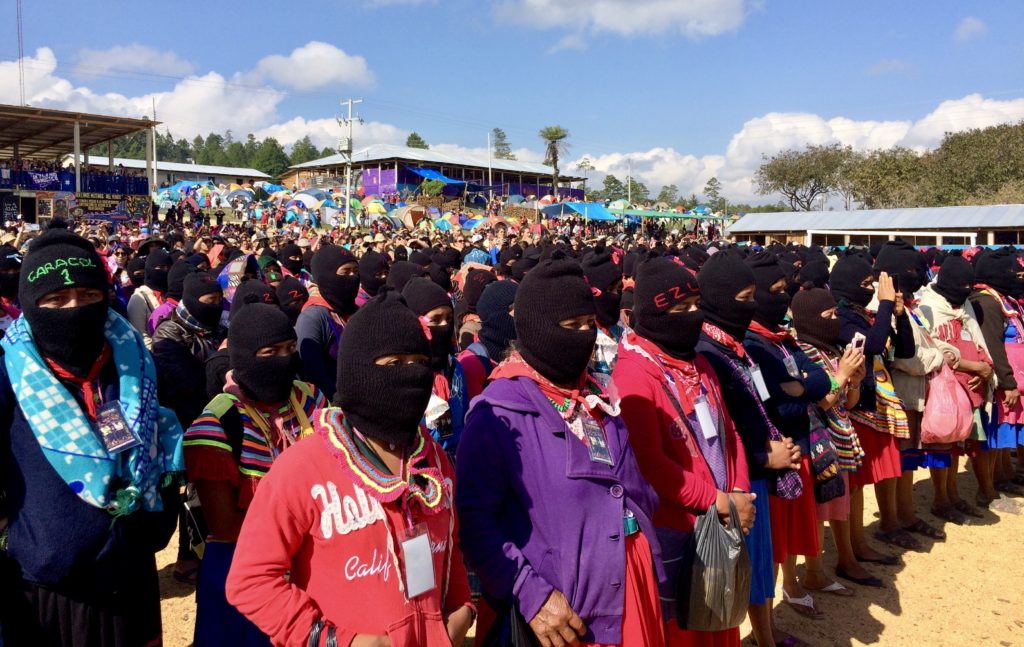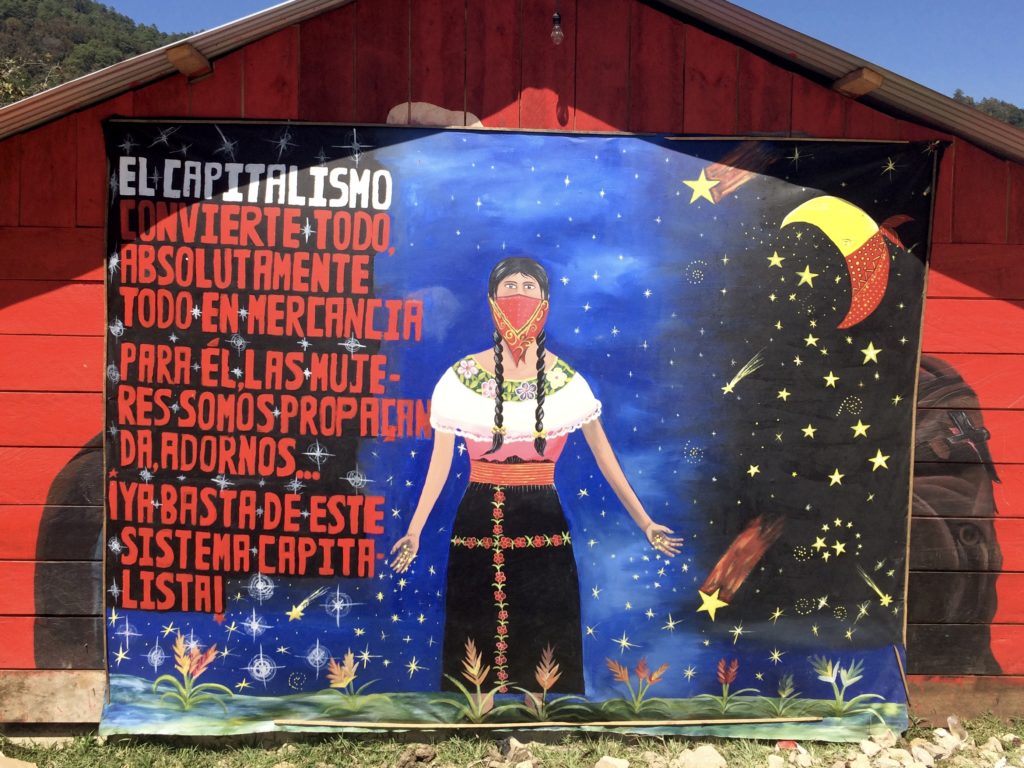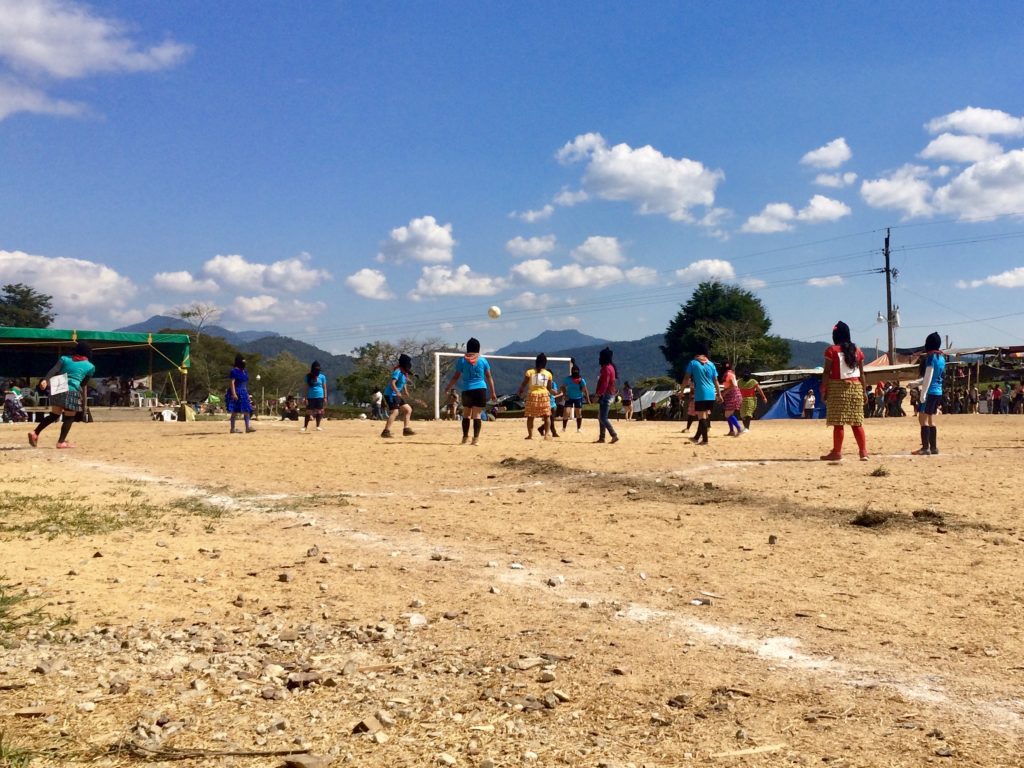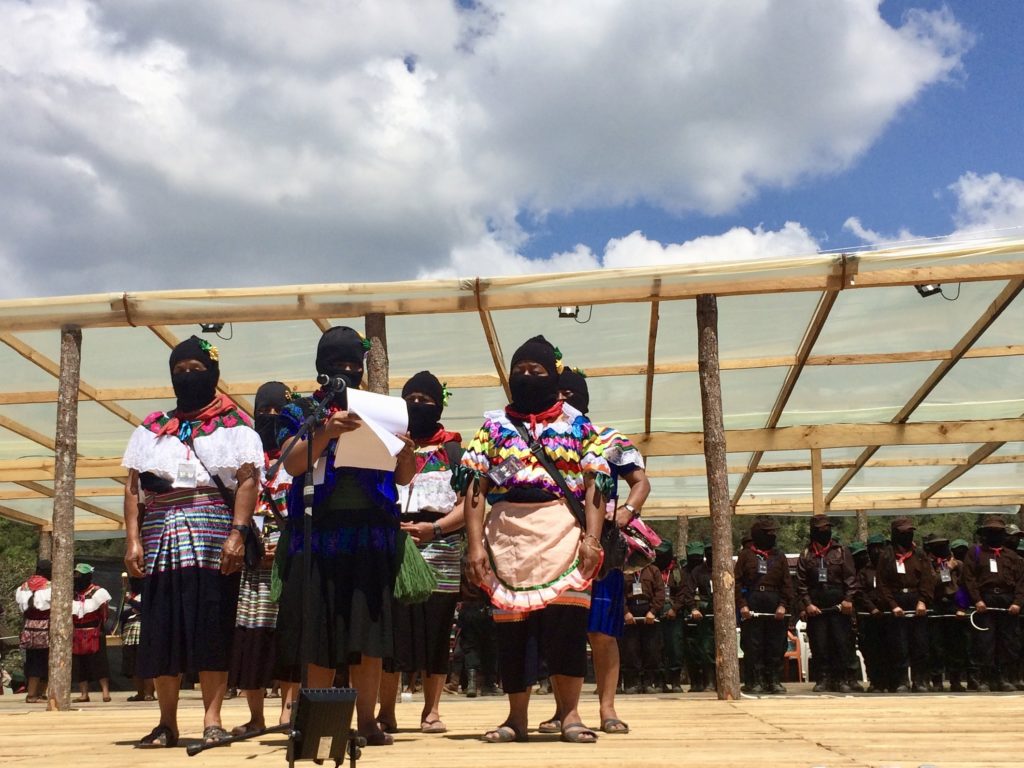
Women insurgents wearing the Zapatista’s iconic black balaclavas greeted thousands of women from over four dozen countries at the entrance to the Zapatista Caracol in the highlands of Chiapas under a vibrant banner reading “Welcome women of the world.” The insurgents ushered visitors through gates emblazoned with red stars and the letters EZLN into what would be a women-only space for more than 72 hours.
Kicking off the first International Political, Artistic, Sporting, and Cultural Gathering of Women who Struggle surrounded by murals celebrating women’s resistance, Zapatista compañeras invited women from around the globe to commit to organizing to rise up and fight capitalism and patriarchy.
“We don’t ask you to come fight for us, just as we won’t go fight for you,” said Insurgente Erica, launching the three-day gathering on International Women’s Day in the Tzots Choj region of the southern Mexican state. “The only thing we ask is that you keep struggling, don’t surrender, don’t sell out, and don’t stop being women who struggle.”
The Mayan indigenous Zapatistas and their fight to build alternatives to capitalism from the bottom up have inspired anti-establishment social movements around the globe for more than two decades. Emerging from the jungle in an armed insurrection after years of underground organizing, the Zapatista National Liberation Army declared war on the Mexican state on January 1, 1994, the day the North American Free Trade Agreement went it to effect. Predicting that NAFTA would worsen inequality that kept rural indigenous people chronically impoverished, they demanded indigenous self-determination over land and cultural and political autonomy.
As global revolution to overthrow neoliberal capitalism remained a pipe dream and the Mexican government failed to follow through on promises to grant indigenous communities rights to autonomy, the Zapatistas built de facto autonomous communities where “the people command and the government obeys.” They organized local participative decision-making systems, healthcare and education services, and communal agriculture projects to sustain their communities without government support.
Zapatista women called the international gathering as a response to the fact that capitalism and patriarchy not only continue to abuse and devalue women, but are also to blame for women’s murders. They invited women of all ages, races, and beliefs to “meet, talk, and listen as women.” They welcomed participants to submit proposals for activities, or just show up to the join the party.
“We agree to live, and for us to live is to struggle,” continued Erica. “So we agree to each struggle in our own way, place, and time.” Her words were met with enthusiastic cheers and shouts of “Long live Zapatista women!”
The Zapatistas shared their collective histories as indigenous women and their experiences of fighting for a world where many worlds fit.

They recounted how their grandmothers suffered “double mistreatment” at the hands of bosses who ruthlessly abused them in systems of indebted servitude and at the hands of their own husbands who took a page out of the colonizer’s book to beat and disparage them. Weaving together tales of the broader Zapatista uprising for land and indigenous dignity and their own struggles as women, they shared how they began organizing in secret despite facing challenges such as illiteracy and extreme sexism. Refusing to remain at the sidelines, they fought men to have a place in the resistance.
“It wasn’t men that gave us rights to participate, it was the first compañeras who started the struggle and opened our eyes,” said Compañera Marina on behalf of women from Caracol 3 in the Selva Tzeltal area. “We women drive life, and capitalism drives death, terror, and anguish all over the world. That’s why we should struggle together.”
The compañeras also humbly celebrated major advances in health, education, and women’s rights achieved through autonomous organizing, communal projects, and political consciousness-raising. They explained how being truly liberated means rooting out the patriarchy engrained in everyday interactions, showing that in Zapatista territory, struggling to change the world is a way of life.
Listening to the compañeras’ stories of resistance in the face of poverty, racism, sexism, and — in the wake of the 1994 armed uprising — military repression, was a moving experience for many participants.
“The Zapatistas offered us an impressive demonstration of discipline, patience, leadership, and collective memory,” said Ana Francis Mor, a member of the Mexico City-based cabaret crew Las Reinas Chulas, whose theater works tackle social issues through satire and farce. Identifying herself as an urban, privileged, white woman, she said that the Zapatistas prompted her to reflect on her own work, forms of humor, and participation in a “rotten system” while also trying to rebel.
“These women and this movement made a change in themselves. I’ve never seen this level of dignity,” she continued. “Are we going to go back to continue doing more of the same, or are we going to let this break through and change us?”
Spanish artist Iris Serrano also felt challenged by the Zapatista’s call for place-based resistance. “I can link up with the Zapatista struggle, with Palestine … but I have to pay attention to what my struggle is from the place I’m in,” said Serrano, who painted a mural in the Caracol with the words “Sow rebellion, harvest freedom” and the image of a woman with plants sprouting from her breasts and a beating heart in her hand. “It’s easier to go a thousand kilometers from home than to attend to my own (struggle).”

Astrid Cuero Montenegro, a doctoral student from Cali, Colombia, living in San Cristobal de las Casas, Chiapas, agreed that the Zapatista women led by example, including by creating an environment of mutual respect throughout the three-day gathering.
“There’s a feminism that comes from experience,” she said, drawing a parallel between Zapatista women and the indigenous domestic laborers she works with San Cristobal. In both cases, she said, these women carry out political work that is feminist in practice.
“That’s the lesson the Zapatista compañeras give us,” she said. “It’s not necessary to call yourself feminist to have exceptional capacity to organize.”
Cuero Montenegro added that compared to other “feminist” conferences she has attended, the Zapatista gathering was unique for its broadly inclusive character. “Sometimes ideological fractures haven’t allowed us to manage to listen,” she explained, adding that many women showed an openness to listening and not imposing their own views.
The Zapatista women set the stage for that kind of interaction from the outset, encouraging women to listen with respect. “We didn’t invite you to compete,” Insurgente Erica said in the opening address. “We invited you to come together as different and equal.”
Against the backdrop of the Zapatista’s analogy of a “forest of women” made up diverse individual trees, women at the conference enjoyed live music, book and poetry readings, theater performances, and art displays; formed teams to play soccer, volleyball, and basketball; and shared experiences in discussions on the defense of land and resources, movement organizing, sexism in the media, racism, women’s participation in politics, sexual diversity, health, safe abortion, indigenous rights, gender violence, and more.
They also joined workshops on topics ranging from dance, self-defense, and capoeira to ecological sanitary napkin-making, facilitation strategies, and the guiding principles of the Zapatista movement. Unscheduled activities also popped up organically as women came together around common interests and cultivated the seeds of new initiatives while strengthening existing ones.
Bernarda Pesoa Torres, a member of the Paraguayan indigenous campesina organization Conamuri, found value in coming together to meet in person, where she shared information about her culture and movement. “All of us women here are going to take this immense strength with us,” she said, noting that many women, especially indigenous women, face similar challenges in their daily lives and that it’s empowering to shed light on those struggles. She added that although she never imagined she would set foot in Zapatista territory, learning from their organizing offered an opportunity for her to develop her own leadership capacity.
Zapatista women, who were shocked by the large turnout, also valued the international exchange. “We really like hearing the experiences of other women who are here,” said Compañera Dalia, a coordinator from Caracol 3, adding that Zapatista women would continue discussing what they learned with fellow compañeras in their communities. “It is important that we all organize ourselves as women against the bad capitalist system.”

Juliana K’abal Xok, a US-based Maya-descendant anthropologist who studies ancient Mayan culture, believed that some people, namely white women, could have done more homework before attending the event to educate themselves on Zapatista history and decolonization. “It’s challenging to be here in what should be a decolonial space and still have to be constantly educating white women,” she said, suggesting that the gathering could benefit from more boundaries being set to combat white entitlement.
Nevertheless, K’abal Xok agreed that the event enabled “beautiful” interactions and a glimpse into how Zapatista women, who she said were part of a lineage of “2000 years of (Mayan) warrior queens,” are remaking their societies from the bottom up.
Over the past quarter of a century since the Zapatistas made their resistance against global capitalism public to Mexico and the world, women have made strides in securing respect for their rights and dignity. They have also overcome deep-rooted discrimination to take on leadership roles to fortify their communities.
For example, women fought for the creation of the Zapatista Women’s Revolutionary Law in the early 1990s to enshrine basic rights like political participation, healthcare, and freedom from violence. They also spearheaded a move to ban alcohol in Zapatista communities, which they credit with slashing high levels of domestic violence. Educating and empowering themselves, they also fostered a sense of self-worth as indigenous women, fighting back against the legacy of generations of colonization, exploitation, and abuse. Though challenges remain, they celebrate being alive and able to resist, even if it’s according to the Zapatista adage “slow but moving forward.”
At the end of the three days, the compañeras thanked participants for sharing and proposed coming together again next year as women who fight capitalism and patriarchy. But above all, they urged women to go home and organize their own gatherings to continue the momentum and to be able to return to Zapatista territory with bigger and deeper hearts, minds, and struggles.
Heather Gies is a freelance journalist who writes about human rights, resource conflicts, and politics in Latin America. Follow her on Twitter @HeatherGies
